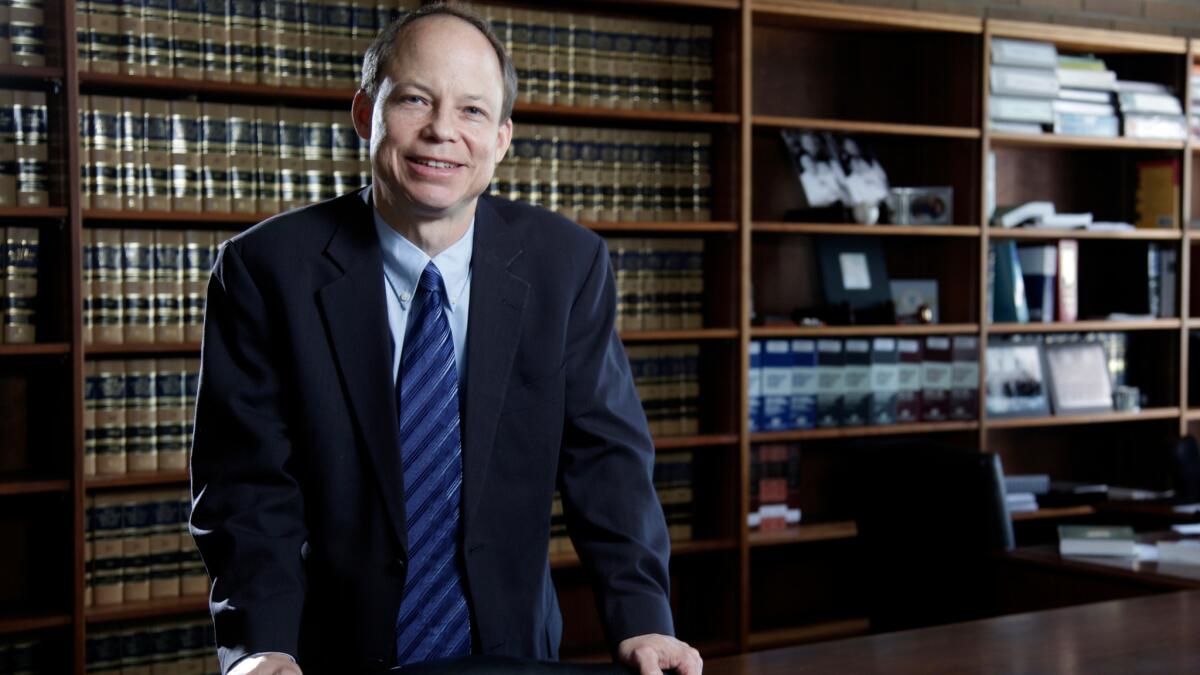Prosecutors ‘lack confidence’ in Stanford sex assault judge — and that could be a big problem for him

The judge who sentenced former Stanford University swimmer Brock Turner to six months in jail in a sexual assault case is facing a recall effort as well as demands that he be disciplined.
But he’s also facing a different kind of threat from the local district attorney’s office.
Santa Clara County prosecutors on Tuesday blocked Superior Court Judge Aaron Persky from hearing another sex crime case, citing his decision in the Turner case.
“We are disappointed and puzzled at Judge Persky’s unusual decision to unilaterally dismiss a case before the jury could deliberate,” Dist. Atty. Jeff Rosen said. “After this and the recent turn of events, we lack confidence that Judge Persky can fairly participate in this upcoming hearing in which a male nurse sexually assaulted an anesthetized female patient. In the future, we will evaluate each case on its own merits and decide if we should use our legal right to ask for another judge in order to protect public safety and pursue justice.”
Prosecutors remove judge in Stanford swimmer sex assault case from new sex crimes case »
California court procedures allow prosecutors or defense lawyers to file a motion to remove a judge from a case and have it reassigned to another jurist.
Legal experts described the move, known as papering, as unusual but hardly unheard of.
“You have a right to remove one judge one time in a case. You are saying you believe another judge will be fairer. It is rare. It is a strategic call, but it does happen,” said Dmitry Gorin, a defense attorney and a former sex crimes prosecutor in Los Angeles. “Sometimes papering a judge sends a message to the judge.”
A rarer move is known as blanket papering, when a prosecutor seeks to remove a specific judge from all their prosecutions, Gorin said. In such extreme cases, a judge can end up being moved to another courthouse or another part of the court system, such as hearing civil cases, so they can function on the bench.
This issue came up several years ago when Orange County prosecutors rejected a judge for several cases after he scrutinized the district attorney’s office over its controversial jail informant program.
“Papering a judge is a lot easier than recalling them from office,” said Loyola Law professor Laurie Levenson. “A prosecutor, if they repeatedly do it, can effectively remove the judge from their cases.”
Levenson said getting a recall on the ballot requires an enormous number of voter signatures across a county and noted that it would be months before an election could be held to vote on a judge’s removal.
It’s unclear whether Santa Clara prosecutors will challenge Persky on other cases.
Prosecutors sought to have Persky removed after several jurors refused to serve in the judge’s courtroom because of his actions in the Turner case.
Persky could not be reached for comment.
An effort to recall Persky is gaining steam, with several political groups vowing to raise money for the campaign.
One of the jurors who voted to convict Turner of sexual assault wrote a letter to Persky saying he was “absolutely shocked and appalled” at the six-month sentence.
On Monday, some state lawmakers said the Turner case proved that the definition of rape was out of date and needed updating.
See the most-read stories this hour »
When Turner was convicted by a jury in March, he faced a maximum sentence of 14 years in prison. Prosecutors asked the judge to sentence him to a six-year prison term for the three felony counts of which he was found guilty, assault with the intent to commit rape of an unconscious person, sexual penetration of an unconscious person and sexual penetration of an intoxicated person.
Later, Turner’s chief probation officer, Monica Lassettre, recommended a sentence of county jail, three years’ probation and sex offender treatment, according to a probation report.
In the weeks after Turner’s sentencing, nearly 1 million people signed online petitions calling on the California Commission for Judicial Performance to remove Persky.
Persky, who was appointed to the bench by Gov. Gray Davis in 2003, is up for reelection in November.
So far, no one has submitted paperwork to challenge Persky or recall him, according to Anita Torres, spokeswoman for the Santa Clara County registrar of voters.
The woman who was sexually assaulted by Turner read a 12-page letter in open court, calling the lack of a state prison sentence “a soft time-out, a mockery of the seriousness of the assaults.”
More than 250 students signed a letter submitted to Persky before Turner’s sentencing, asking that he be held accountable for his actions.
At Sunday’s commencement ceremony, several Stanford students waved signs in support of victims of sexual assault and called on university officials to publicly release names of students who were found responsible for sexual assault.
Judges are rarely recalled from office in California. Most who do leave office are removed following an investigation by the state Commission on Judicial Performance with a hearing on an issue of serious abuse, Levenson told The Times last week.
An effort to recall Orange County Superior Court Judge M. Marc Kelly for sentencing a child molester to 10 years instead of 25 years to life failed this year. Nancy Wieben Stock, a now-retired Orange County judge, weathered a recall effort in the 1990s after she awarded O.J. Simpson custody of his two children following his acquittal on charges of killing his ex-wife, Nicole Brown Simpson.
Some in Santa Clara County have come to the judge’s defense, saying he is a strong jurist who was within his rights to hand down the sentence. Legal experts have said the sentence was within the law but lighter than normal for such cases.
ALSO
Juror in Stanford sex assault case appalled by ‘ridiculously lenient’ sentence for Brock Turner
Stanford rape sentence unusually light, legal experts say
Some Stanford graduates protest during Sunday’s commencement ceremony
‘I can’t believe what you did.’ Judge in Stanford sexual assault case slammed by potential jurors
UPDATES:
12:12 p.m.: This article was updated with comments from Loyola Law professor Laurie Levenson.
This article was originally published at 8:34 a.m.
More to Read
Sign up for Essential California
The most important California stories and recommendations in your inbox every morning.
You may occasionally receive promotional content from the Los Angeles Times.











